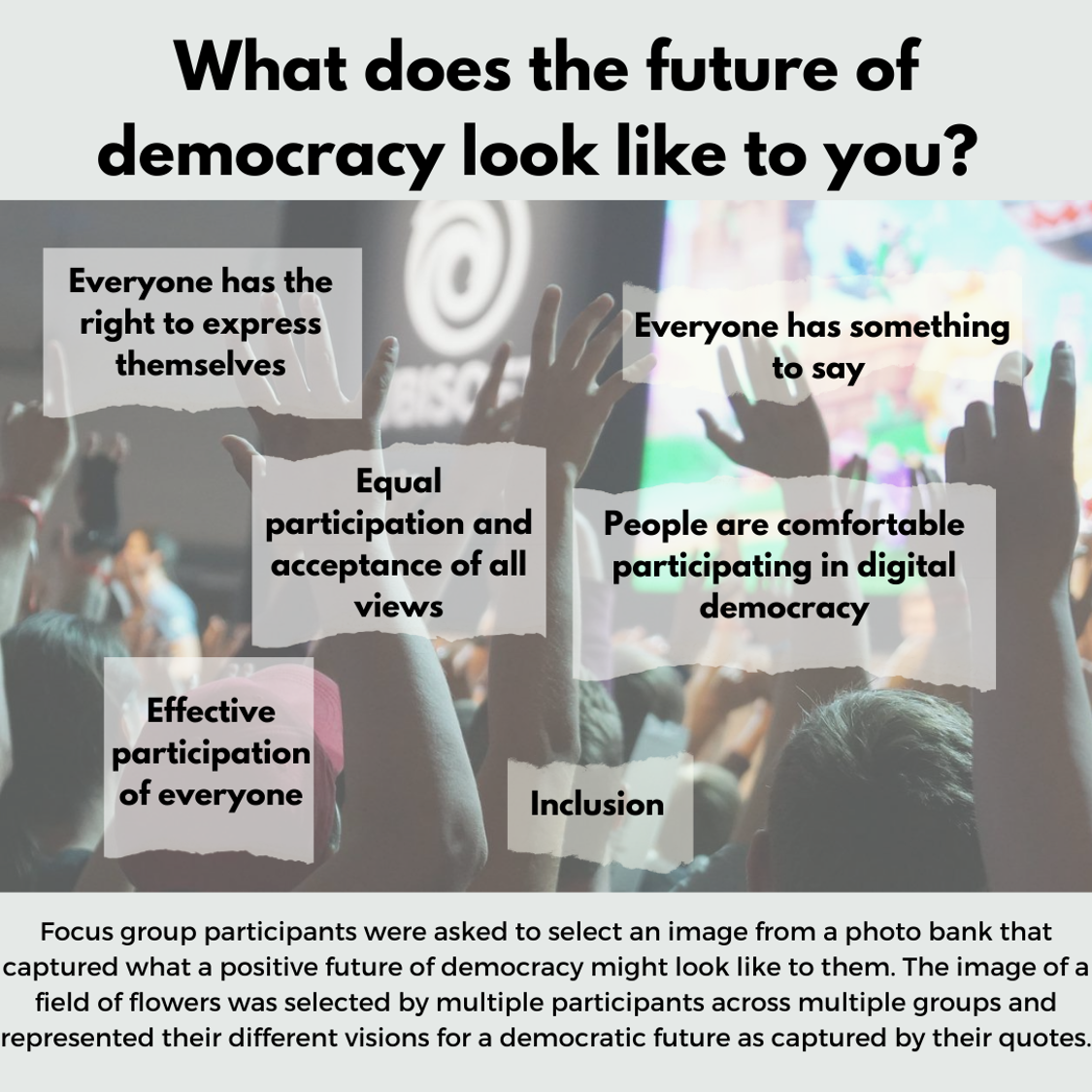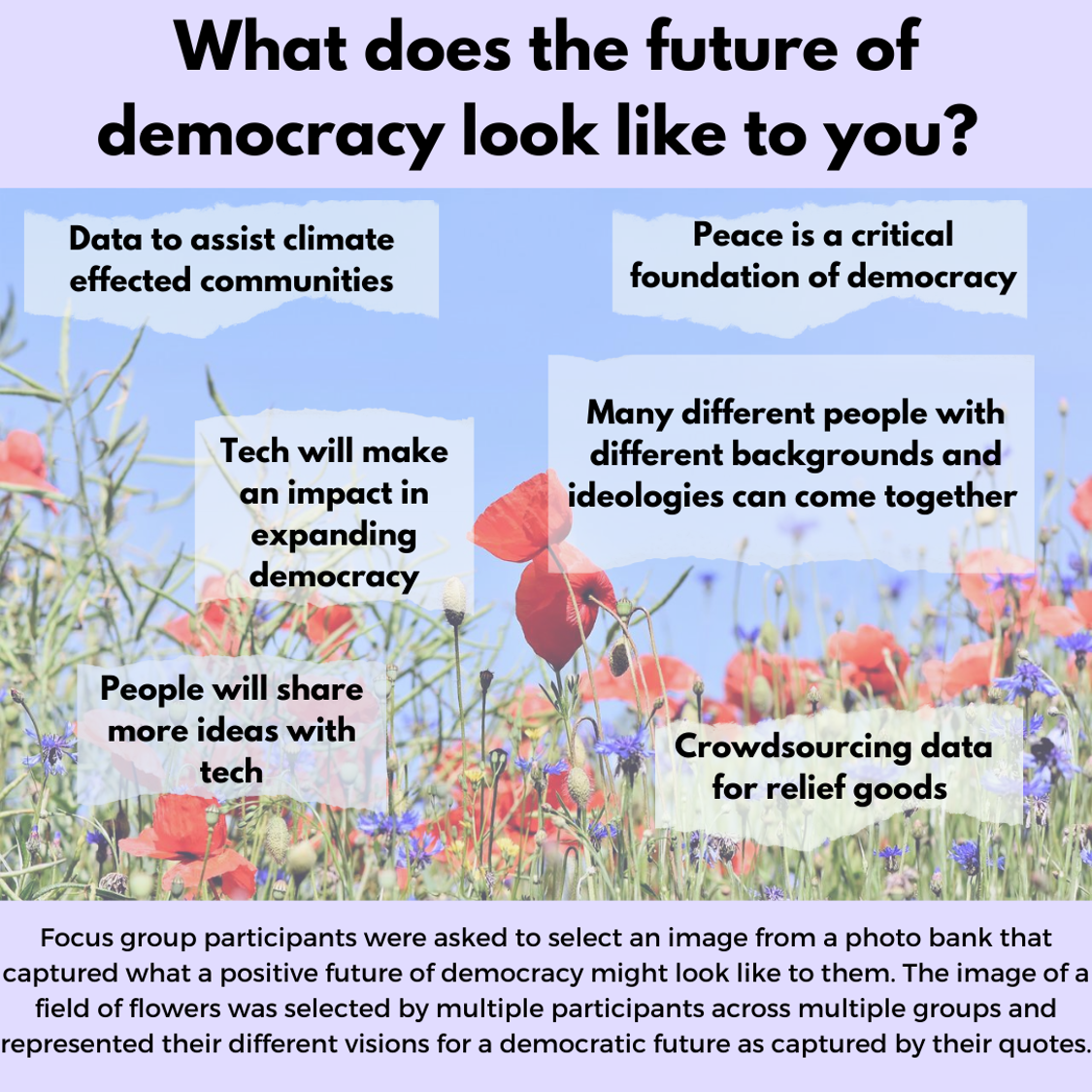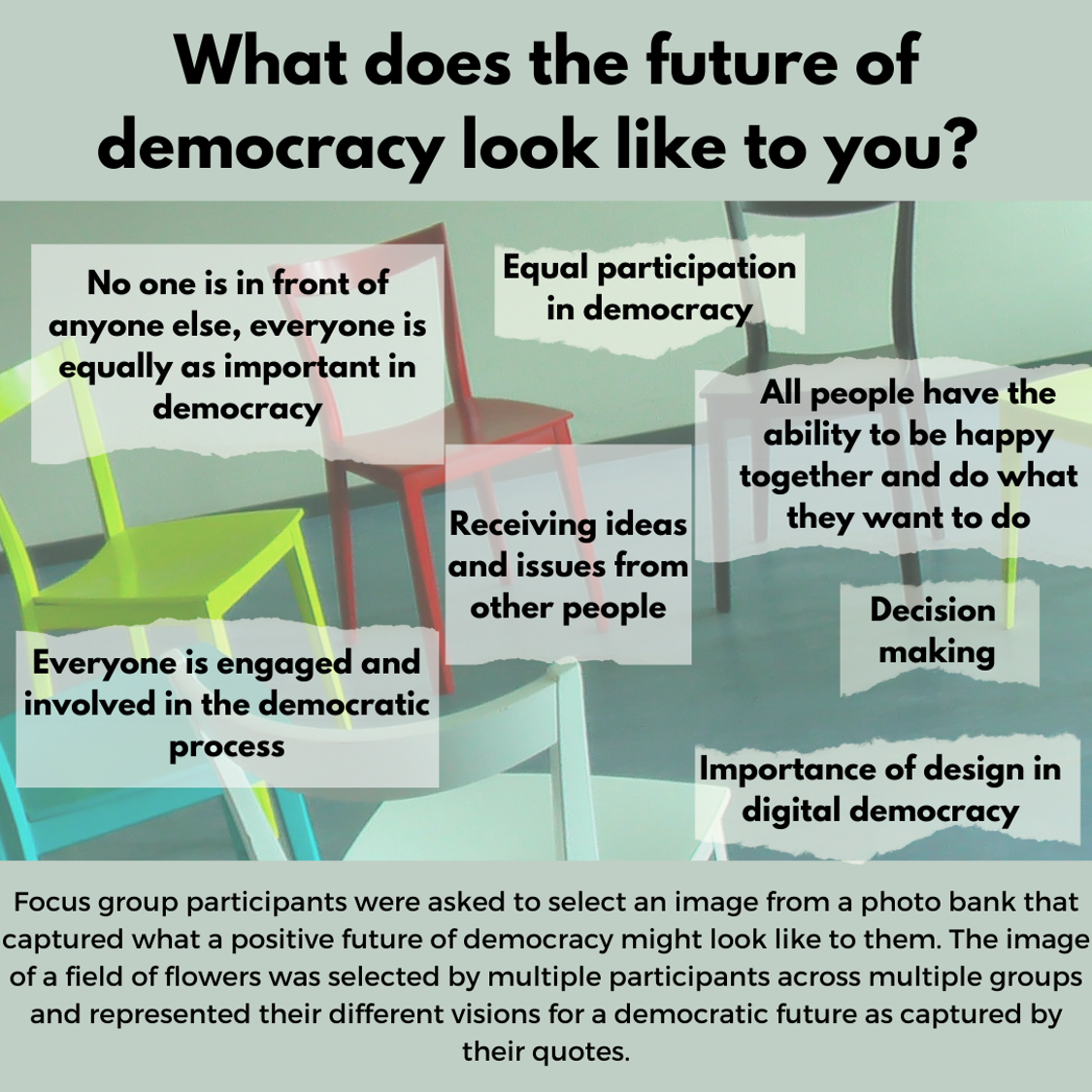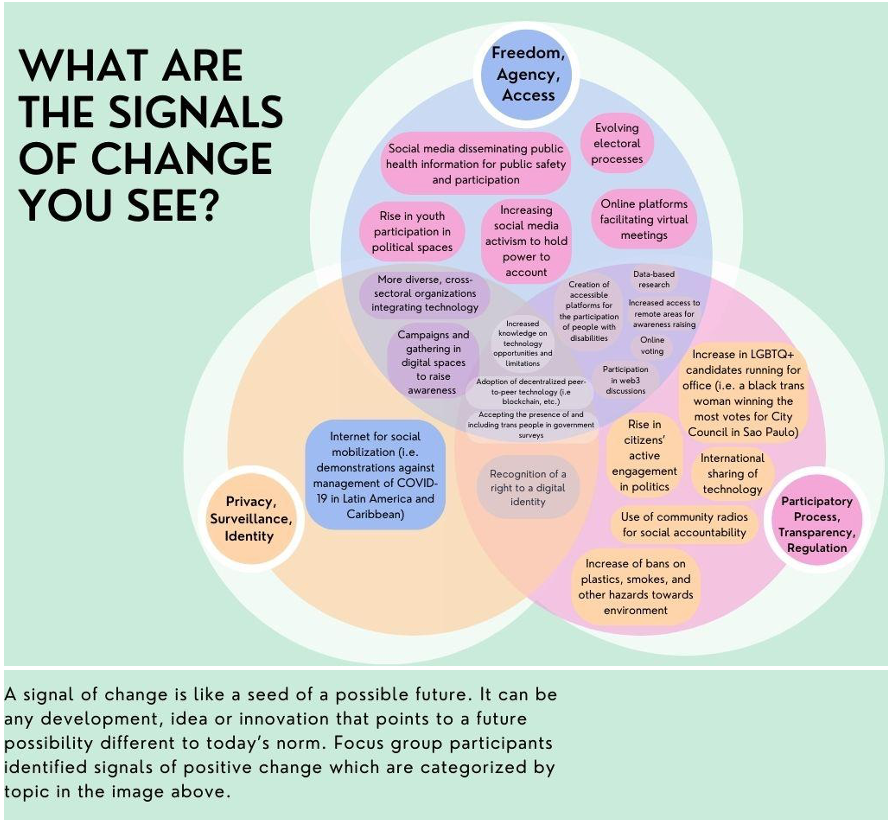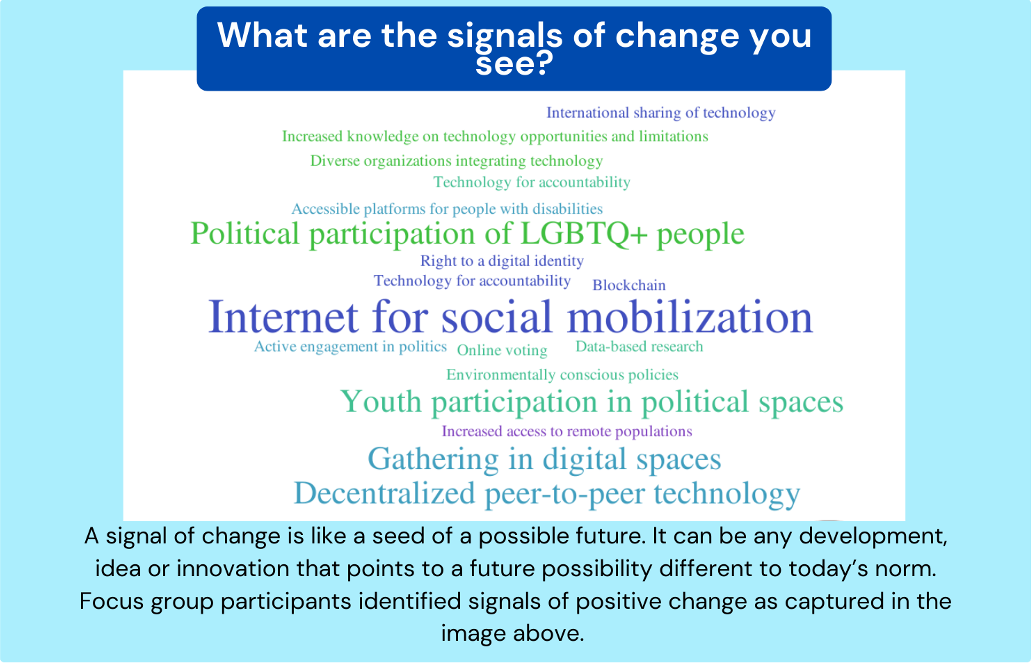In the fall of 2022, NDI gathered civil society partners for a series of five focus groups to discuss their vision for a positive future of democracy. Participants highlighted images that inspired them, discussed signals of change in their community, and envisioned the world and its citizens in 2040. The quotes, photos, and stories in this section share their view of this positive, tech-enabled democratic future.
Visions for 2040
What is your vision for the world in 2040?
We envision a world in which all people, regardless of sexuality, ability, or gender identity, can participate in – and lead – democratic processes and are safe from discrimination and violence. United in the struggle for LGBTQIA+ and disabled community representation in elections and government, we’re working to create mechanisms of safety for those that are elected so that they aren’t targeted. Although still on the margins, we’re starting to see positive signs of inclusion such as in In Brazil, over 50% increase in LGBTQ+ candidates running for office, with a black trans woman winning the most votes for City Council in Sao Paulo; Tanzania has recognized trans identifying people on government surveys, so the data can open up access to social services. Our vision will take unified efforts to restructure the current funding models that allow companies to profit from disinformation, and make government technologies more transparent so people can understand where their votes are going.
What is your vision for the world in 2040?
We envision a future in which people participate in collective decision-making and democratic processes, using decentralized technology (like Blockchain). In this future, technology is an instrument – an important tool – but people make it possible and play the central role. Consciousness is growing around the role of community in political decision-making. With the rise of digital pathways and artificial intelligence, there are more informal opportunities for people to participate and respond to demands, giving their opinion.
What is your vision for the world in 2040?
We envision a world in which diversity of people and thought is celebrated and political participation is inclusive of everyone. Advancements in technology mean greater participation and access to information. People care about their communities and are involved in community level decision making. More young people are able to participate in political spaces, and this is enabled through technology where people don’t have to meet in person to have their voices heard. Young people have worked to achieve many things, including bans on plastics, and other environmental pollution. Through radios, social media, and online meeting platforms, people are connected and energized.
What is your vision for the world in 2040?
We envision a world where people are happy and free. People are able to share and express themselves and live together peacefully. The internet is used to organize social demonstrations, such as those that happened in Latin America to protest the government’s handling of Covid-19. There are campaigns and gatherings in digital spaces to raise awareness on taxes, such as in the DRC. Countries in the global South are well supported by established democracies in the EU and US, enabling citizen participation without fear.
What is your vision for the world in 2040?
We envision a world where ordinary citizens leverage technology to improve democracy. More youth are engaged, running for office, and multiple generations of families are galvanized to shift mindsets of governments to view youth as active participants in government. Tech-based community interventions are making an impact – crowdsourcing data, collecting data on the ground for everything from democratic processes to the distribution of relief goods where they are most needed – to communities experiencing the impacts of climate-caused natural disasters. With technology able to translate across languages in real time, international solidarity has increased, strengthening labor movements and allowing people more flexibility at work because of a more distributed economy and stronger safety net. Electoral processes have evolved to include online voting, data-based research, and awareness-raising in remote areas. Decentralized peer-to-peer technology, such as blockchain, ensures right to participation in Web3 and a right to a digital identity.
Quotes
“We want to improve our electoral system and with the help of the Internet and social media, I believe we will achieve the kind of leadership we desire even before 2040.” (Male participant from Nigeria)
“Las personas fortalecen la democracia – a través de la consciencia de cultura y la realidad virtual – es más importante aprender como utilizar la tecnología para facilitar democratic procesos” – translation: “People strengthen democracy – through consciousness of culture and virtual reality – it’s more important to learn how to use technology to facilitate democratic processes.” (Digital Democracy Advocate from Peru)
“Why bother participating if you don’t feel heard? If you don’t understand where your vote goes… [you’ll think that your] vote doesn’t matter.” (A staff member of a Brazilian LGBT organization)
“[We should] put effort to raise the voice of the voiceless – struggling marginalized groups to have a voice – if we want things to be perfect, [we should] set measures TODAY to change mindsets… like advocacy or community campaigns, and organizing.” (Female participant from Rwanda)
“I like the image of the chairs in a circle because it reminds me of how the way a room is designed or the way chairs are set up in a room can make a big difference to how comfortable people in the room feel participating. So, it makes me think about the importance of design in digital democracy” (Civic Technologist from Jordan)
Images for a Democratic Future
